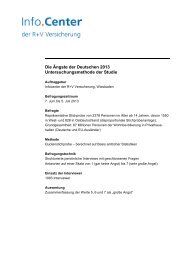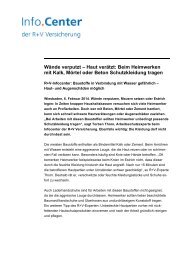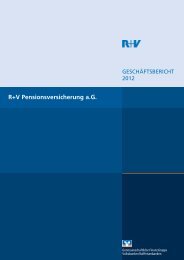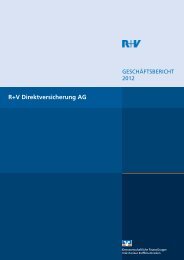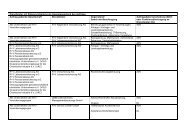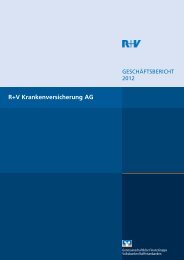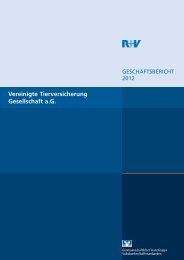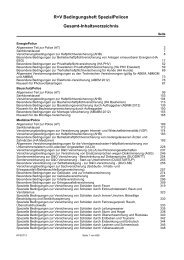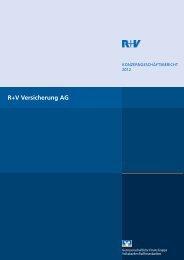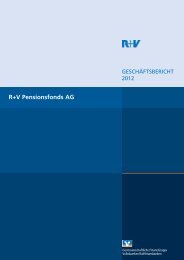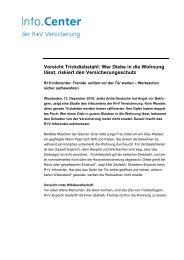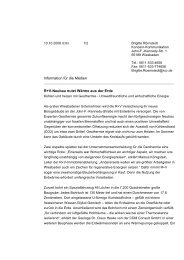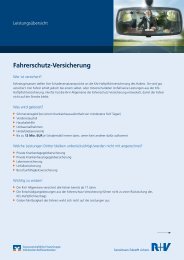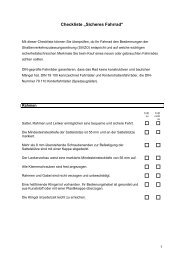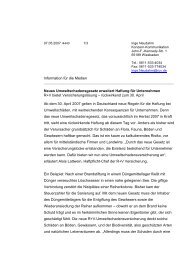Annual Report 2011 - R+V Versicherung
Annual Report 2011 - R+V Versicherung
Annual Report 2011 - R+V Versicherung
Create successful ePaper yourself
Turn your PDF publications into a flip-book with our unique Google optimized e-Paper software.
8<br />
Business development and basic conditions<br />
Thanks to its numerous initiatives, such as the parent-child<br />
offices and the fitness centre, <strong>R+V</strong> was awarded the coveted<br />
accolade of ‘Top Employer in Germany’ by the research company<br />
CRF for the fourth time in <strong>2011</strong>. <strong>R+V</strong> also entered the<br />
Germany-wide competition ‘Germany’s Best Employer’, run by<br />
the Great Place to Work ® Institute, and was awarded the seal of<br />
approval ‘Germany’s Best Employer <strong>2011</strong>’ in its first attempt.<br />
Its position as an attractive employer offers <strong>R+V</strong> advantages in<br />
terms of the recruitment of qualified specialist staff and binds<br />
employees from its own ranks even closer to the company.<br />
Also in <strong>2011</strong> <strong>R+V</strong> supported numerous community initiatives<br />
which have their roots in the corporate concept of ‘help for<br />
self-help’. These range from the Kinder-Unfallhilfe initiative,<br />
which campaigns for increased children’s safety on the roads,<br />
to a theatre group of people with disabilities run by Lebenshilfe<br />
Wiesbaden e.V and the Wiesbaden BürgerKolleg foundation.<br />
The BürgerKolleg foundation is the first organisation in Germany<br />
to offer educational and training programmes free of<br />
charge for volunteer workers in Wiesbaden.<br />
In terms of customer care, the values of partnership and service<br />
are traditionally at the forefront. This is documented in<br />
<strong>R+V</strong>’s commitment to the code of conduct for the sale of insurance<br />
products of the Gesamtverband der Deutschen <strong>Versicherung</strong>swirtschaft<br />
e.V (GDV, or German Insurance Association).<br />
The customer-friendly rules of conduct signed by all<br />
<strong>R+V</strong> domestic insurance companies were also a guideline for<br />
<strong>R+V</strong>’s work in <strong>2011</strong>.<br />
Association memberships<br />
The company is a member of the following associations/organisations<br />
among others:<br />
– Gesamtverband der Deutschen <strong>Versicherung</strong>swirtschaft e.V.<br />
(GDV, or German Insurance Association)<br />
– International Cooperative and Mutual Insurance Federation<br />
(ICMIF)<br />
– Association of Mutual Insurers and Insurance Cooperatives<br />
in Europe (AMICE)<br />
– Association des Professionnels de la Réassurance en France<br />
(APREF)<br />
Important legal and financial influences<br />
Macroeconomic development in <strong>2011</strong><br />
In spite of the debt crisis in Europe, economic trends in<br />
Germany continued to prove unusually robust in <strong>2011</strong>. Gross<br />
domestic product went up by 3.0% compared with 3.7% in<br />
the previous year. There were positive developments in the<br />
employment market. The number of people registered as<br />
unemployed fell to just below the three million mark thereby<br />
reaching its lowest level for a decade.<br />
Developments on the capital markets<br />
In <strong>2011</strong>, the capital markets were dominated by the sovereign<br />
debt crisis and the resulting economic recession. The crisis in<br />
individual countries in Europe escalated into a eurozone crisis<br />
and a global sovereign debt crisis. The USA had its highest<br />
rating, the AAA rating, revoked by one of the largest rating<br />
agencies. Many eurozone countries and their affiliated banks<br />
have had to accept significant rating downgrades. In addition<br />
to a significantly deteriorating economic situation, there were<br />
also special factors such as the nuclear disaster in Japan,<br />
caused by the earthquake in March, and political unrest in<br />
the Arab countries.<br />
The sovereign debt crisis forced the peripheral eurozone<br />
countries in particular to introduce austerity measures which<br />
were in part accompanied by changes of government and economic<br />
downturns. It led to the European Central Bank (ECB)<br />
purchasing government bonds – for the first time ever and<br />
contrary to its policy – and to the creation of new European<br />
Institutions such as the European Financial Stability Facility<br />
and the European Financial Stability Mechanism in order to<br />
combat future crises. The new rescue package for Greece was<br />
anchored by the involvement of a large number of private<br />
creditors which led to an investment blockade. In addition to<br />
Greece, Portugal and Ireland, which were no longer able to<br />
refinance themselves on the capital market, this was also becoming<br />
increasingly difficult for Spain and Italy. Many markets<br />
experienced risk aversion which had a ripple effect.



